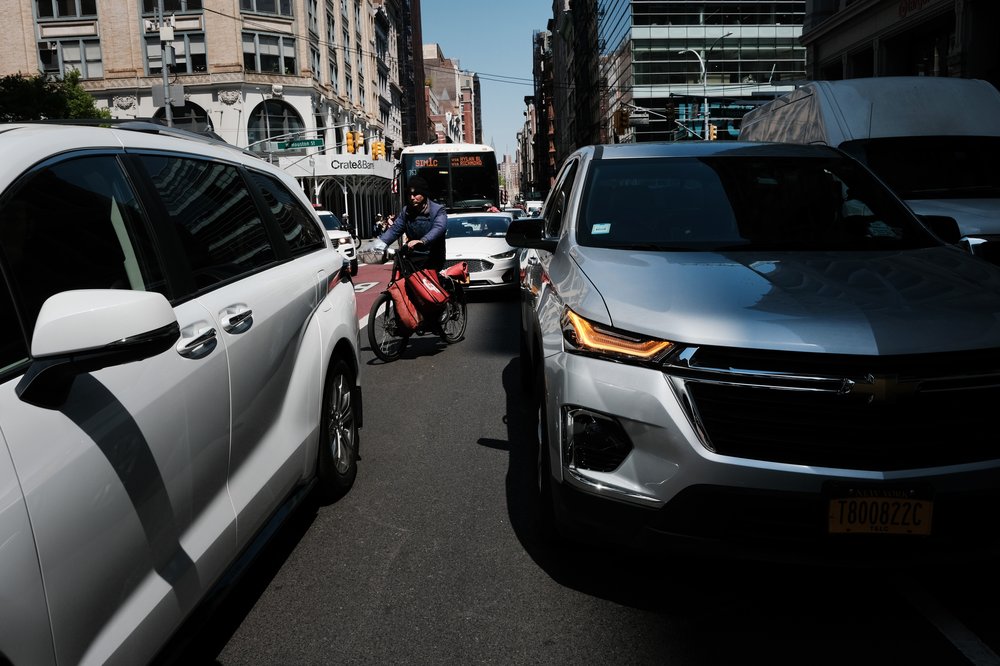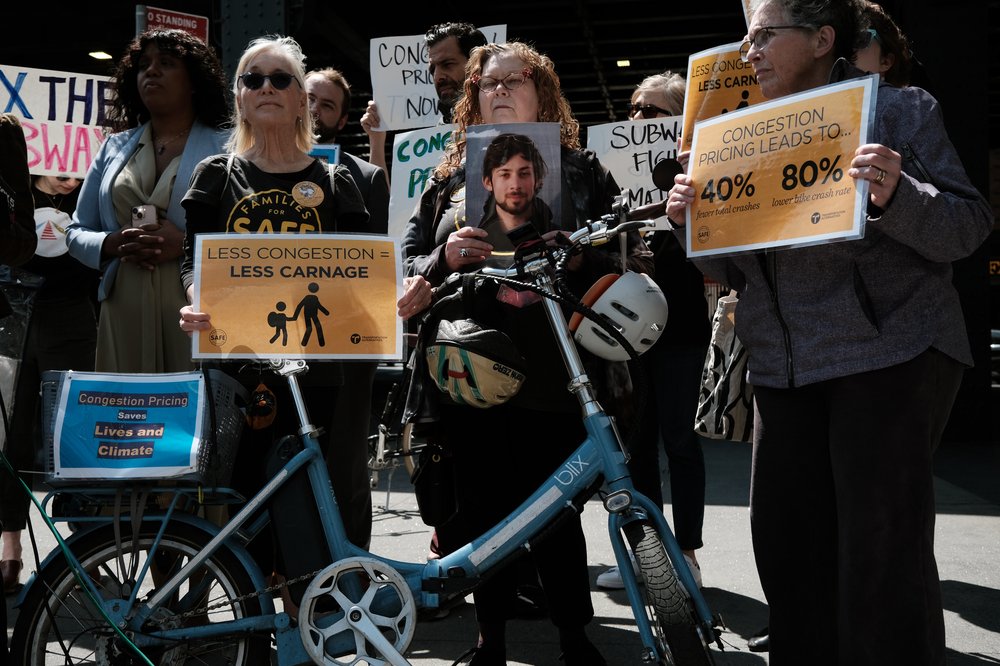Major companies lobby on congestion pricing ahead of meeting on toll costs
Sept. 28, 2023, 5:01 a.m.
State records show the likes of Lyft, Uber, UPS and even Memorial Sloan Kettering Cancer Center spent tens of thousands of dollars since the summer on lobbying, making their cases how much drivers should pay — and who should get a break.

Major nonprofits and corporations have lobbied city and state officials for months about congestion pricing ahead of a Monday meeting of an MTA panel that will consider tolling structures and exemptions for the landmark program.
State records show that since the summer, the likes of Lyft, Uber, UPS and even Memorial Sloan Kettering Cancer Center spent tens of thousands of dollars on lobbying, making their cases to government officials about how much drivers should pay — and who should get a break from the charges. The efforts are revealed in publicly filed state lobbying disclosures.
The stakes are high. Tolls could cost as much as $23 per entry into Manhattan south of 60th Street – representing a massive new potential expense for many companies. UPS, for example, paid the city more than $20 million in parking fines in 2019.
“The intense lobbying shows that special interests are trying to carve themselves out of the tolls,” said Rachael Fauss, a senior analyst at the good government group Reinvent Albany, which has also spent money lobbying officials to minimize exemptions.
“The more people who don't pay, the higher the tolls will be for everyone else. It is in the best interest of the driving and riding public that the MTA stay above the fray, and not give outsized attention to well-financed interests,” Fauss said.
On Monday, the MTA’s Traffic Mobility Review Board will review options for the tolls’ costs and carve-outs. The group is expected to make a recommendation on a tolling scheme next month, which must be approved by the full MTA board.
MTA officials received requests for 122 types of exemptions, the agency confirmed.
Last year, the MTA published a set of seven tolling scenarios for the program, which would charge drivers entering the zone anywhere from $5 to $23. By law, the tolling program must generate $1 billion a year for the MTA’s capital program.
Key to each scenario is who must pay the tolls – and how many times they must do so each day for entering and exiting the toll zone.
When federal officials signed off on the MTA’s program, they required the MTA to only charge taxis and for-hire vehicles once a day.
The Black Car Fund — which represents for-hire vehicle drivers — spent $35,000 in July and August on lobbyists who sent a memo to every member of the City Council arguing against the tolls, according to the most recent state lobbying disclosures.
Officials from the Black Car Fund did not respond to a request for comment.
The communication was sent to the city lawmakers — who have no authority over congestion pricing — ahead of a Council hearing in August on the program.
"While the Council is not the decision-making body on congestion pricing, we provide venues for all stakeholders in our city to share their perspectives," said Council spokesperson Benjamin Fang. "That’s why last month the Council held a public hearing on congestion pricing, providing a platform for New Yorkers to convey their diverse views on the proposed details of the program."
Disclosures also show big players like Lyft, Uber and UPS also targeted city and state officials in their lobbying efforts on the incoming tolls in July and August.

Uber spokesperson Josh Gold said the company’s lobbying on congestion pricing focused on “reminding” government officials of specific details included in the 2019 law creating the program. The rideshare giant cited the $400 million the MTA receives each year through a “congestion surcharge” on every for-hire vehicle or taxi trip that enters the busiest parts of Manhattan.
Gold said the company is also pushing for “parity” between for-hire vehicles and yellow taxis.
Lyft spokesperson CJ Macklin said the company has similar concerns about the program.
“We support comprehensive congestion pricing, but rideshare and taxis already have been paying a congestion fee since 2019 that has generated more than $1 billion in revenue to the MTA,” Macklin wrote in a statement. “It's important that the [Traffic Mobility Review Board] takes this into account and doesn't unfairly penalize rideshare users with a double assessment."
A UPS spokesperson declined to comment.
Memorial Sloan Kettering Cancer Center, which is headquartered north of the congestion pricing zone on the Upper East Side but has locations within the zone in Midtown, has since July lobbied MTA and state Department of Health officials on the incoming tolls.
Jeanne D'Agostino, a spokesperson for the health care provider, said the group lobbied the Traffic Mobility Review Board to provide toll exemptions for “cancer patients too vulnerable to travel on public transportation or whose condition requires regular therapy, treatment, assessments or medical services.”
Records show Coach USA, which runs buses into the Port Authority Bus Terminal from New Jersey and New York’s northern suburbs, also lobbied city and state officials in recent months. Company reps did not respond to a request for comment.
While the lobbying took place behind closed doors, a number of groups have also launched very public campaigns to call for toll exemptions.
They include a motley coalition of environmental groups, transit advocates, Uber and Lyft dubbed Congestion Pricing Now. The coalition sent a letter to members of the Traffic Mobility Review Board this week calling for discounts to drivers who already pay other tolls to cross bridges and tunnels into Manhattan.
The group wrote that failing to do so would lead to “toll shopping,” pushing more cars onto the free bridges over the East River.
“If New York’s congestion pricing program is to become the model for the nation, rather than a cautionary tale, it is essential that the [Traffic Mobility Review Board], state, and MTA ensure the program is implemented in a way that is equitable, and such that no communities are disproportionately impacted by toll shopping,” the letter states.
The lobbying comes as New Jersey Gov. Phil Murphy and other Garden State politicians try to block congestion pricing from going into effect next year through a lawsuit.
Recent filings in the case show lawyers for New Jersey accusing the federal government – which gave the MTA the go-ahead to initiate the program – of intentionally slow-walking the case.
Randy Mastro, a lawyer for New Jersey, accused the federal government of “a delay tactic meant to make congestion pricing a fait accompli.”
“The Traffic Mobility Review Board — the board tasked with setting the pricing scheme — is currently determining the final details and parameters of that scheme. Thus, because the project is forging ahead, this case must also move forward to ensure New Jersey its day in court before the misguided congestion pricing scheme is implemented,” Mastro wrote in a letter earlier this month.
MTA will not boost service when congestion pricing goes into effect 3 global cities have had congestion pricing for decades. How's it going?